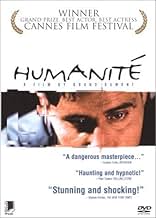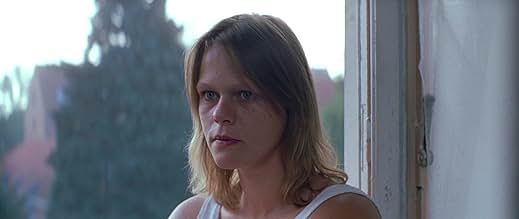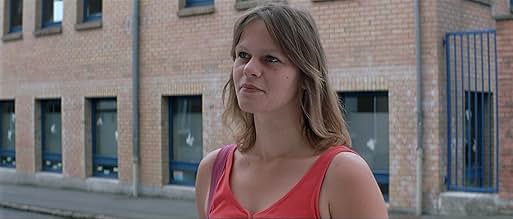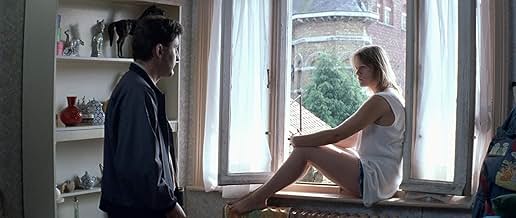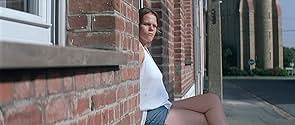Ajouter une intrigue dans votre langueWhen an 11-year-old girl is brutally raped and murdered in a quiet French village, a police detective who has forgotten how to feel emotions--because of the death of his own family in some k... Tout lireWhen an 11-year-old girl is brutally raped and murdered in a quiet French village, a police detective who has forgotten how to feel emotions--because of the death of his own family in some kind of accident--investigates the crime, which turns out to ask more questionsWhen an 11-year-old girl is brutally raped and murdered in a quiet French village, a police detective who has forgotten how to feel emotions--because of the death of his own family in some kind of accident--investigates the crime, which turns out to ask more questions
- Prix
- 3 victoires et 3 nominations au total
- L'infirmier
- (as Daniel Leroux)
- Le policier anglais
- (as Robert Bunzl)
Avis en vedette
A policeman investigates the brutal murder of a young girl in a French town and that's pretty much it. It's even less than that in some respects. For example the girl is found in the opening minutes, but it's 50 minutes before any real investigation begins. Instead it focuses on the policeman (Pharaon) and his two friends (lovers Domino and Joseph). They go to the beach, to a restaurant, stand outside their houses having stunted conversations and generally wasting the day away. Pharaon goes for a bicycle ride and tends to his allotment. Essentially nothing happens. There are maybe four or five actual plot points altogether, and the rest is filled with chat of the "Hi, how are you?" variety, long shots of people walking or driving, or opening doors. The entire film follows a kind of rhythmic cycle that becomes hypnotic if you allow it.
Which brings us to the actors. The DVD notes say they're all non-professionals. Not amateur actors, but real people who are acting for the first time. The actor who plays Joseph does reasonably well, but Domino is excellent (and it's an extremely brave performance for any actress).
Emmanuel Schotte (as Pharaon) is amazing. It's simply one of the greatest performances I've ever seen. Imagine Travis Bickle with 99pc of the anger taken out. Then cross him with Forrest Gump (with non of Hanks' caricature or comedy). Cast a non-actor who looks like a cross between Clive Owen and Alfred Molina and you're somewhere close. He's a very unlikely cop. He's wide-eyed, innocent, and simple. He's slow and deliberate. Brief comments from other characters tell us his wife and child died two years ago, and he looks like a man still stunned, as if he'd just heard the news. This is never hinted at once; we don't ever see what he was like before, no one ever tells him "You've changed", but the audience gets the feeling this is a man suffering desperately from the pain of grief. Most of this is expressed in Schotte's eyes which are desperately sad.
This low-key little film requires patience. Without Schotte's performance I don't think there'd be much of a film here. Be prepared for an extremely slow film, but one that's never boring. It will polarise opinion like few other films I've seen so I can't recommend it to everyone (and there are some very graphic sex scenes), but I thought it was amazing.
You get a shot of Pharoan looking at his boss's collar. The shot of the collar holds long enough for you to think "Hm, he sweats a lot." The shot holds long enough for you to think "okay, I got that, thanks. He sweats a lot." Then it holds long enough for you to think "All right already! Go wake up the editor."
A sequence like that would not be a problem when the cinematography is particularly good, except the cinematography in this film is not. It is competent, straightforward, unstylized, perhaps even dull; in other words, the cinematography serves the story perfectly.
The sedate pacing might not be a problem with different cinematography, which would affect the story for the better: the film is a psychological exploration, yet the people we're meant to sympathize with are typically shown in long shots or in closeup but with largely unchanging expressions. If something is going on behind the eyes, we can only guess what it is; and from the slack-jawed expression, we guess that what it is might not even be particularly profound. Wounded, yes, sad, yes, but we've seen that before and better, and it's nothing new. We need a reason to care *this time*, and for many people that reason won't be there.
The main character is a cipher, perhaps deliberately so, but the result is a film that doesn't tell you anything, and doesn't even tell you why it doesn't tell you anything--not the nihilism or the weary practicality of some noir films, but merely a bloated anecdote with an obscure or missing point. Unfortunately the anecdote, aside from being quite slow, is also almost completely humorless. The result is a film only for people with extraordinary patience and good will.
Pharaon is a slow-witted police superintendent who is anything but pharaonic. He had a girlfriend and a baby, now dead. (We are not told how.) He is friends with Domino, a big-boned, sensitive, slatternly woman next door, and Joseph, her handsome beau, with whom she seems to never stop having sex. In their small town, a little girl has been raped and murdered. Pharaon pursues this case, as he pursues a sort of inarticulate love for Domino. Along the way, a light dawns in Pharaon--a dreadful light. He becomes sensitive to the suffering of all living things--a pig hurt by the suckling of her young, all the way to a motorist getting a beating outside police headquarters. The effect this has is to create a kind of moral schizophrenia in Pharaon: he can filter out nothing. Like an overlap of Raskolnikov and Prince Mishkin, Pharaon takes both the world's sin and sufferings on his back.
But this gives only the barest outline of the experience of L'HUMANITE, which is not about its plot. Indeed, the relationship of Dumont's handling of the materials of cinema to the story itself is unique in my experience of narrative moviemaking. Like Abbas Kiarostami in his recent work, Dumont uses the landscape not to illustrate the story, but to propose a dialectic against it. Where the landscape acts as an argument for life in Kiarostami's TASTE OF CHERRY, here it does something else. It vibrates with feeling. In its childlike gaze at the hardness of people and things, L'HUMANITE tries to get at the shifting feelings underneath--the emotions and sensations so elusive there are no words for them. The movie proves that literary means--finding names--are unnecessary. Dumont finds aural-visual-rhythmic means to voice those emotions.
His techniques can be daring, appalling. Pharaon, gradually overwhelmed by the world's thousand and one cruelties, starts to spontaneously embrace (relative) total strangers, in scenes one can imagine giving audiences giggles. Dumont doesn't care.
L'HUMANITE is the kind of movie that, while you're watching it, you feel can drive you crazy in places, but which you know you'll live with and re-play in your head for the rest of your life. And Cannes naysayers to the contrary, all the performances in this movie--all of them, down to the tiniest--are perfect.
A note: I would like to thank the other people who wrote about L'HUMANITE on IMDB. With no other movie have I felt I learned so much by reading other people's responses, and particularly noting the details they chose to underline. For the authenticity and unabashedness of everyone's responses, I am truly grateful.
While the pace of the film is slow, you do get a feeling that such an approach is necessary. As such, you get many long shots. You also get shots that are very upfront and will no doubt make many in the audience feel uneasy.
There will be many different comments about the show. I heard some French guys coming out of the cinema and lauding it as "Pure Cinema" while others have complained that it was pretentious. For me, I thought it was boring.
Le saviez-vous
- AnecdotesThe body of the raped little girl was a silicone cast.
- Citations
[first lines]
l'inspecteur de police Pharaon De Winter: I'm coming.
- Autres versionsItalian distributor BIM originally removed about 2 minutes of sex footage from the Italian theatrical release in order to avoid a 'not under 18' rating. When the press criticized this self-censorship attempt, the distributor reissued the film in its original, integral form.
- Bandes originalesLe Vertigo, Rondeau. Modérément
from "Pièce de Clavecin"
Music by Pancrace Royer
Performed by William Christie
Courtesy of harmonia mundi
Meilleurs choix
- How long is Humanité?Propulsé par Alexa
Détails
- Date de sortie
- Pays d’origine
- Sites officiels
- Langues
- Aussi connu sous le nom de
- Humanity
- Lieux de tournage
- Bailleul, Nord, France(Village)
- sociétés de production
- Consultez plus de crédits d'entreprise sur IMDbPro
Box-office
- Brut – États-Unis et Canada
- 113 495 $ US
- Fin de semaine d'ouverture – États-Unis et Canada
- 10 075 $ US
- 18 juin 2000
- Durée
- 2h 21m(141 min)
- Couleur
- Mixage
- Rapport de forme
- 2.35 : 1

